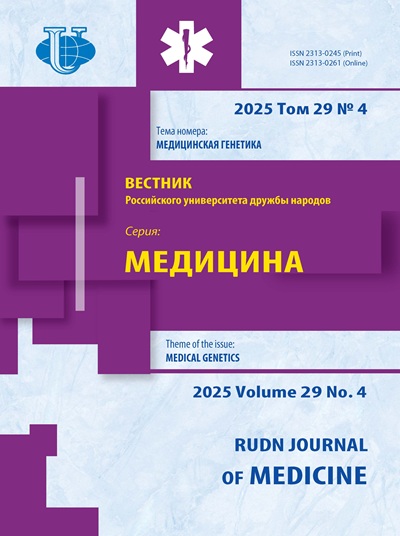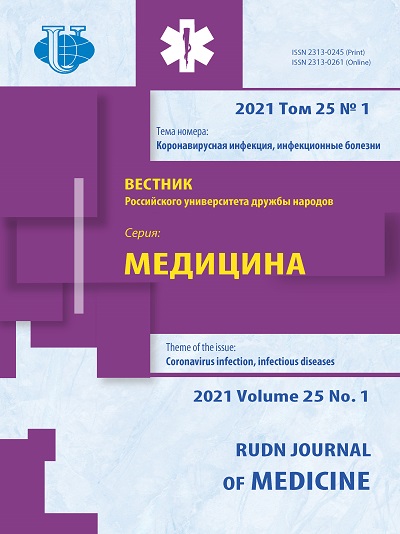Indomethacin & SARS-CoV-2: Prospects for clinical management of the inflammatory state
- Authors: Kodidala S.R.1, Sorout J.1, Jayachandra S.2, Narapogu V.3
-
Affiliations:
- K.D. Medical College, Hospital and Research Centre
- Zydus Medical College
- Government Medical College
- Issue: Vol 25, No 1 (2021): CORONAVIRUS INFECTION, INFECTIOUS DISEASES
- Pages: 25-30
- Section: CORONAVIRUS INFECTION, INFECTIOUS DISEASES
- URL: https://journals.rudn.ru/medicine/article/view/25434
- DOI: https://doi.org/10.22363/2313-0245-2021-25-1-25-30
- ID: 25434
Cite item
Full Text
Abstract
Severe acute respiratory syndrome - (SARS) is a pandemic (called as SARS-CoV-2 or COVID-19), severely affected by transmission and fatal disease caused by unknown coronavirus family of RNA virus (SARS-COV). Humans are under great threat among other species were non-identified. Phenotype can range from asymptomatic to fulminate cytokine storm which leads multiorgan failure resulting death. Still the world is eagerly waiting for antiviral drug to stop the corona virus infection. Previous studies found that indomethacin had ability to inhibit the RNA and DNA virus replication. Objectives . Interleukins (IL), Interferons (IFN) and metabolites like «cyclopentane cyclooxygenase» (COX 1/COX 2) are active against several RNA viruses. Experts have divided the SARS infection in three phases (Phase-1, 2, 3) based on severity of infection. In phase-3 there was «cytokine storm» due to exuberant inflammation observed which can damage organs and even fatal. We investigated that effect of indomethacin on COX inhibitor on coronavirus replication and cytokine storm in reducing the hyper inflammatory state. In this article we tried to assess the clinical management of inflammation due to SARS-COV-2 by Indomethacin. Results . Indomethacin can cause relief from the pain on taking deep breath in corona virus infected patients. Indomethacin can be considered safe and effective for prevention and treatment of coronavirus infection also antiviral activity. Conclusion : Indomethacin is a potent inhibitor of SARS CoV-2.
Keywords
About the authors
Satyanath R. Kodidala
K.D. Medical College, Hospital and Research Centre
Author for correspondence.
Email: ksatyanath1989@gmail.com
Mathura, India
J. Sorout
K.D. Medical College, Hospital and Research Centre
Email: ksatyanath1989@gmail.com
Mathura, India
S. Jayachandra
Zydus Medical College
Email: ksatyanath1989@gmail.com
Dahod, Gujarat, India
V. Narapogu
Government Medical College
Email: ksatyanath1989@gmail.com
Budaun, Uttar Pradesh, India
References
- Huang C, Wang Y, Li X, et al. Clinical features of patients infected with 2019 novel coronavirus in Wuhan, China. Lancet. 2020;395(10223):497-506.
- Zhou P, Yang X-L, Wang X-G, et al. A pneumonia outbreak associated with a new coronavirus of probable bat origin. Nature. 2020:10.1038/s41586-41020-42012-41587.
- Xu H, Zhong L, Deng J, et al. High expression of ACE2 receptor of 2019-nCoV on the epithelial cells of oral mucosa. Int J Oral Sci. 2020;12(1):8.
- Cao Y, Li L, Feng Z, et al. Comparative genetic analysis of the novel coronavirus (2019-nCoV/SARS-CoV-2) receptor ACE2 in different populations. Cell Discovery. 2020;6(1). doi: 10.1038/s41421020-0147-1.
- Shi Y, Wang Y, Shao C, Huang J, Gan J, Huang X, Bucci E, Piacentini M, Ippolito G, Melino G. COVID-19 infection: the perspectives on immune responses. Cell Death Differ. 2020;27(5):1451-1454. doi: 10.1038/s41418-020-0530-3.
- Arend W.P. Interleukin-1 receptor antagonist. Adv Immunol. 1993;54:167-227.
- Burger D, Chicheportiche R, Giri JG, Dayer JM. The inhibitory activity of human interleukin-1 receptor antagonist is enhanced by type II interleukin-1 soluble receptor and hindered by type I interleukin-1 soluble receptor. J Clin Invest. 1995;96:38-41.
- Conti P, Ronconi G, Caraffa A, Gallenga CE, Ross R, Frydas I, Kritas SK. Induction of pro- inflammatory cytokines (IL-1 and IL-6) and lung inflammation by Coronavirus-19 (COVI-19 or SARS-CoV-2): anti-inflammatory strategies. Masters P.S., Perlman, S. Coronaviridae. In: Knipe D.M., Howley P. (eds) Fields Virology. Lippincott Williams and Wilkins, Philadelphia, PA. 2013:825- 858.
- Brunton LL, Parker L, Blumenthal DK, Buxton ILO. Goodman and Gilman’s Manual of Pharmacology and Therapeutics. New York: McGraw-Hill Medical, 2008:446-47.
- Amici C, Di Caro A, Ciucci A, et al. Indomethacin has a potent antiviral activity against SARS coronavirus. Antivir Ther. 2006;11:1021-30. https://hospitalhealthcare.com/covid-19/indomethacin-has-a-positive-impact-on-covid-19-symptoms.
- Brunton LL, Parker L, Blumenthal DK, Buxton ILO. Goodman and Gilman’s Manual of Pharmacology and Therapeutics. New York, NY: McGraw. Hill Medical. 2008:446- 447.
- Day M. Covid-19: ibuprofen should not be used for managing symptoms say doctors and scientists. BMJ. 2020;19:m1086.
- Gupta R, Misra A. Contentious issues and evolving concepts in the clinical presentation and management of patients with COVID-19 infection with reference to use of therapeutic and other drugs used in co-morbid diseases (Hypertension, diabetes, etc.). Diabetes Metab Syndr. 2020;14:251-254.
- Updated: WHO now doesn’t recommend avoiding ibuprofen for COVID-19 symptoms. https://www.sciencealert.com/whorecommends-to-avoid-taking-ibuforfin-for-covid-19-symptoms.
- Chmiel JF, Konstan MW, Accurso FJ, et al. Use of ibuprofen to assess inflammatory biomarkers in induced sputum: implications for clinical trials in cystic fibrosis. J Cyst Fibros. 2015;14:720-726.
- Zhang W., Zhao Y., Zhang F., et al. The use of anti-inflammatory drugs in the treatment of people with severe coronavirus disease 2019 (COVID-19): the perspectives of clinical immunologists from China. Clin Immunol. 2020;214:108393.
- Lucas S. The Pharmacology of Indomethacin. Headache. 2016 Feb;56(2):436-46.
- Draper MP, Martell RL, Levy SB. Indomethacin-mediated reversal of multidrug resistance and drug efflux in human and murine cell lines overexpressing MRP, but not P-glycoprotein. Br. J. Cancer. 1997;75(6):810-5.
- Vane JR, Botting RM. Mechanism of action of antiinflammatory drugs. Adv Exp Med Biol. 1997;433:131-138.
- Tegerder I, Pfeilschifter J, Geisslinger G. Cyclooxygenase- independent actions of cyclooxygenase inhibitors. FASEB J. 2001;15:2057-2072.
- Amici C, La Frazia S, Brunelli C, Balsamo M, Angelini M, Santoro MG. Inhibition of viral protein translation by indomethacin in vesicular stomatitis virus infection: role of eIF2α kinase PKR. Cell. Microbiol. 2015;17(9):1391-404.
- Hoppmann RA, Peden JG, Ober SK. Central nervous system side effects of nonsteroidal anti-inflammatory drugs. Aseptic meningitis, psychosis, and cognitive dysfunction. Arch. Intern. Med. 1991;151(7):1309-13.
Supplementary files















